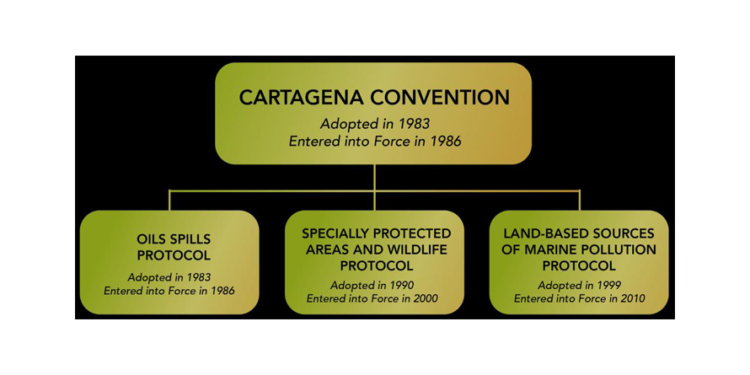Saint Kitts and Nevis Ratifies Cartagena Convention Protocols
The Federation of St. Kitts and Nevis has solidified its commitment to environmental protection and sustainable development by ratifying two crucial protocols of the Cartagena Convention: the Specially Protected Areas and Wildlife (SPAW) Protocol and the Land Based Sources of Marine Pollution (LBS) Protocol. This significant step underscores the nation’s dedication to preserving its rich marine biodiversity and mitigating the detrimental impacts of pollution on its coastal and marine ecosystems. The ratifications, effective September 26, 2024, bring the total number of signatories to 19 for SPAW and 16 for LBS, further strengthening regional cooperation in safeguarding the Wider Caribbean Region’s (WCR) shared natural heritage. This action aligns with St. Kitts and Nevis’ overarching goal of transitioning into a sustainable island state, prioritizing environmental stewardship and biodiversity protection as core tenets of its development strategy.
The ratification of these protocols by St. Kitts and Nevis has been widely lauded by regional and international environmental organizations. Chris Corbin, Coordinator of the Cartagena Convention Secretariat of the United Nations Environment Programme (UNEP), emphasized the significance of this move in demonstrating the continued relevance of the Cartagena Convention and its protocols in supporting governments within the WCR to address environmental challenges. He further highlighted the potential of the Convention to facilitate the exploration of new green and blue economy opportunities. The UNEP views this as a positive step towards fostering a sustainable balance between economic development and environmental protection.
Within St. Kitts and Nevis, government officials have expressed unwavering support for the ratifications. Dr. Joyelle Clarke, Minister of Sustainable Development, Environment and Climate Action, and Constituency Empowerment, emphasized the prioritization of sustainable development, environmental stewardship, and biodiversity protection as integral components of the nation’s development agenda. She framed the ratification as a crucial step towards achieving the goal of a sustainable island state, where legislation and policy effectively support the ambition of a protected, pollution-free environment. Dr. Clarke acknowledged the support provided by the UNEP regional team in facilitating the ratification process.
The Honourable Samal Duggins, Minister of Agriculture and Marine Resources, echoed this sentiment, highlighting the crucial role of healthy marine ecosystems in ensuring food security, supporting livelihoods, and bolstering resilience against the impacts of climate change. Minister Duggins emphasized the government’s commitment to establishing a sustainable equilibrium between development and the protection of natural resources for the benefit of future generations. This commitment reflects a long-term vision of sustainable resource management that balances economic growth with environmental preservation.
Susana Perera Valderrama, Programme Management Officer of the SPAW Sub-Programme at the Secretariat, underscored the importance of the SPAW Protocol ratification for protecting St. Kitts and Nevis’ unique marine biodiversity and contributing to broader regional and global conservation efforts. She highlighted the significance of regional cooperation in achieving shared conservation goals and encouraged the remaining nine countries yet to become contracting parties to join the SPAW Protocol, thereby strengthening collective efforts to safeguard the Caribbean’s shared marine natural heritage.
Laverne Walker, Programme Management Officer for the Marine Pollution Programme at the Secretariat, emphasized that the ratification of the LBS Protocol signifies St. Kitts and Nevis’ commitment to mitigating the impacts of land-based pollution sources on the marine and coastal resources of the WCR. She acknowledged the country’s ongoing efforts to reduce pollutant impacts and highlighted the Secretariat’s support through its involvement in three regional projects focusing on pollution reduction within the Convention area. The Secretariat anticipates continued collaboration with St. Kitts and Nevis in its efforts to minimize the negative impacts of pollutants on the marine environment. The Secretariat’s ongoing support underscores the importance of collaborative partnerships in addressing regional environmental challenges.
The Cartagena Convention Secretariat is actively involved in several projects aimed at protecting the Caribbean Sea. These include the Global Environment Facility (GEF) funded Caribbean Regional Fund for Wastewater Management + Project, which focuses on implementing innovative, small-scale solutions for integrated water and wastewater management. Another project, PROMAR, aims to reduce plastic pollution and marine litter in several Caribbean nations, including St. Kitts and Nevis. Furthermore, the GEF-funded Integrating Water, Land and Ecosystems Management in Caribbean Small Island Developing States (IWECo) project has been supporting Caribbean SIDS for the past five years in addressing biodiversity resource management, land degradation, and climate change. These initiatives collectively demonstrate a comprehensive approach to addressing the multifaceted environmental challenges facing the region.
The Convention for the Protection and Development of the Marine Environment of the Wider Caribbean Region (WCR), known as the Cartagena Convention, is a regional legal agreement dedicated to protecting the Caribbean Sea. Adopted in Cartagena, Colombia in 1983 and entering into force in 1986, the Convention is supported by three protocols: Oil Spills, SPAW, and LBS. Currently, 26 United Nations Member States in the WCR have ratified the Convention, demonstrating a broad regional commitment to marine environmental protection. The United Nations Environment Programme (UNEP), the leading global voice on the environment, provides leadership and encourages partnerships in environmental stewardship, inspiring nations and peoples to improve their quality of life without compromising the well-being of future generations. The UNEP’s support of the Cartagena Convention and its protocols underscores the importance of international cooperation in addressing global environmental challenges.
Share this content:












Post Comment